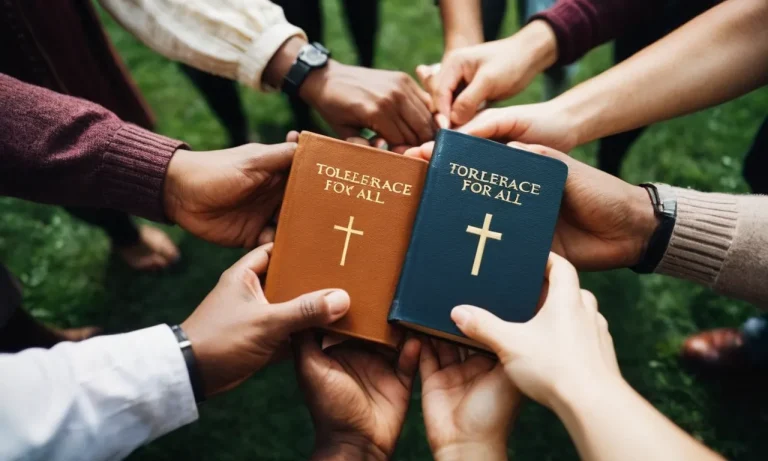Unveiling The Profound Meaning Of The Name ‘Savior’
In a world filled with countless names, each carrying its own unique significance, the name ‘Savior’ stands out as a beacon of hope and redemption. This powerful moniker has captivated the hearts and minds of people across cultures and generations, evoking a sense of reverence and awe.
If you’re short on time, here’s a quick answer to your question: The name ‘Savior’ is derived from the Latin word ‘salvator,’ meaning ‘one who saves or delivers.’ It is a title bestowed upon individuals who have played a pivotal role in rescuing or liberating others from peril, oppression, or suffering.
In this comprehensive article, we will delve into the profound meaning of the name ‘Savior,’ exploring its historical and cultural significance, as well as its impact on various belief systems and societal narratives.
We will unravel the layers of symbolism and examine the qualities and actions that have earned individuals this revered title.
The Origins and Etymology of ‘Savior’
The word “savior” carries a profound meaning that resonates across cultures and religions. It is a term that has been woven into the fabric of human history, representing hope, deliverance, and redemption. Tracing its linguistic roots unveils a rich tapestry of influences and transformations.
Tracing the Linguistic Roots
The origins of the word “savior” can be traced back to the Latin word “salvator,” which is derived from the verb “salvare,” meaning “to save” or “to deliver.” This Latin root has its origins in the Proto-Italic and Proto-Indo-European languages, suggesting a deep-rooted connection to ancient civilizations and their spiritual beliefs.
According to EtymOnline, the earliest known use of “savior” in English dates back to the late 14th century.
The Latin Connection
The Latin connection is particularly significant, as it highlights the influence of Christianity on the word’s meaning and usage. In the Christian tradition, “Savior” is a title bestowed upon Jesus Christ, who is believed to have sacrificed himself to save humanity from sin and grant eternal life.
This theological concept has profoundly shaped the understanding and reverence associated with the term “savior” in the Western world.
Variations Across Languages and Cultures
While the English word “savior” has its roots in Latin, variations of the term can be found across numerous languages and cultures. For example, in Spanish, it is “salvador,” in French, “sauveur,” and in German, “Retter.”
These linguistic variations reflect the universal human desire for deliverance and the shared recognition of those who have played a pivotal role in offering salvation, whether spiritual, physical, or metaphorical.
Beyond the Judeo-Christian traditions, the concept of a “savior” has also manifested in various forms across other religions and belief systems. In Hinduism, for instance, deities like Vishnu and Krishna are revered as saviors who have incarnated to protect dharma (righteousness) and liberate humanity from suffering.
Similarly, in Buddhism, the Buddha is regarded as a savior who showed the path to enlightenment and freedom from the cycle of rebirth. These diverse interpretations and representations of saviors across cultures highlight the profound significance and universality of the concept.
In contemporary times, the term “savior” has also taken on a more secular connotation, often used to describe individuals or entities that have rescued or saved others from perilous situations or dire circumstances.
For example, a firefighter who rescues people from a burning building might be hailed as a “savior,” or a groundbreaking medical treatment that cures a terminal illness could be referred to as a “life-saving” breakthrough.
This broader usage underscores the enduring power and reverence associated with the concept of a “savior,” transcending religious boundaries and resonating with the human experience of overcoming adversity and finding deliverance.
Saviors in Religious and Spiritual Contexts
The Concept of Salvation in Major Religions
Across the world’s major religions, the concept of salvation holds a profound significance. It represents the deliverance from suffering, bondage, or the consequences of sin, offering a path to spiritual liberation and eternal bliss.
In Christianity, salvation is often associated with the belief in Jesus Christ as the Savior, whose sacrifice on the cross is seen as the ultimate act of redemption for humanity (https://www.biblegateway.com).
Similarly, in Islam, the concept of salvation is closely tied to submission to the will of Allah and adherence to the teachings of the Quran (https://www.islamreligion.com). Hinduism and Buddhism, on the other hand, emphasize the attainment of moksha or nirvana, respectively, as the ultimate state of salvation, freedom from the cycle of rebirth and suffering (https://www.hinduwebsite.com, https://www.buddhanet.net).
Messianic Figures and Their Roles
Many religions and spiritual traditions have messianic figures who are believed to play a pivotal role in the process of salvation. In Christianity, Jesus Christ is revered as the Messiah, the Son of God who came to Earth to redeem humanity from sin and offer eternal life to those who believe in Him.
Similarly, in Islam, the Prophet Muhammad is considered the final messenger of Allah, guiding humanity towards the path of righteousness and salvation. In Judaism, the concept of the Messiah is deeply ingrained, with the expectation of a future redeemer who will restore the Jewish people and bring about a time of peace and justice (https://www.jewishvirtuallibrary.org).
These messianic figures are often seen as embodiments of divine intervention, sent to guide humanity towards salvation and spiritual enlightenment.
Saviors as Embodiments of Divine Intervention
In many religious and spiritual traditions, saviors are revered as embodiments of divine intervention, sent to Earth to rescue humanity from the depths of suffering and guide them towards salvation. These figures are often seen as manifestations of the divine, endowed with extraordinary wisdom, compassion, and the power to transform lives.
For instance, in Hinduism, avatars like Lord Krishna and Lord Rama are believed to be incarnations of the Supreme Being, Vishnu, who descended to Earth to restore dharma (righteousness) and protect the virtuous (https://www.hinduwebsite.com).
Similarly, in Buddhism, the Buddha is revered as an enlightened being who attained nirvana and taught the path to liberation from suffering (https://www.buddhanet.net). These saviors are not only revered for their teachings but also for their ability to inspire and transform the lives of those who follow their path, offering hope and guidance in the pursuit of salvation and spiritual fulfillment.
The concept of saviors in religious and spiritual contexts is a testament to humanity’s enduring quest for meaning, purpose, and liberation from suffering. Whether through the embodiment of divine intervention or the teachings of enlightened beings, these figures serve as beacons of hope, guiding humanity towards a path of salvation and spiritual transcendence.
Their stories and teachings continue to inspire and shape the lives of billions worldwide, reminding us of the profound potential for transformation and the enduring power of faith and spiritual awakening. 😇🙏
Saviors in Historical and Cultural Narratives
Legendary Heroes and Their Heroic Deeds
Throughout history, countless narratives have celebrated the exploits of legendary heroes, individuals who have risen above adversity to save their people or communities from imminent peril. From the ancient Greek tales of Hercules and his twelve labors to the Norse sagas of Thor battling the giants, these heroes have captured the imagination of generations.
Their heroic deeds, often imbued with supernatural elements, serve as a testament to the human spirit’s unwavering determination to overcome even the most daunting challenges.
One such legendary hero is Gilgamesh, the protagonist of the ancient Mesopotamian epic of the same name. His journey, which includes battling monsters and seeking immortality, has been interpreted as a metaphor for the human quest for meaning and understanding in the face of mortality.
The enduring popularity of these narratives highlights the universal desire for saviors – individuals who can inspire hope and resilience in the darkest of times.
Saviors as Symbols of Hope and Resilience
Beyond the realm of legends, saviors have also emerged as powerful symbols of hope and resilience in real-world contexts. Throughout history, individuals have risen to the occasion, leading their communities through periods of oppression, conflict, or natural disasters.
Consider the impact of figures like Nelson Mandela, whose unwavering commitment to justice and equality inspired a nation to overcome the oppressive system of apartheid. Or Mahatma Gandhi, whose philosophy of non-violent resistance sparked a revolution that ultimately led to India’s independence from British rule.
These saviors, through their actions and sacrifices, have become beacons of hope, reminding us of the power of perseverance and the indomitable nature of the human spirit. Their legacies continue to inspire generations, serving as a reminder that even in the face of seemingly insurmountable challenges, change is possible when people unite behind a common cause.
The Impact of Saviors on Social Movements
Saviors have played a pivotal role in shaping social movements, galvanizing communities to challenge injustice and fight for change. From the civil rights movement in the United States to the struggle against apartheid in South Africa, saviors have emerged as catalysts for societal transformation.
Their ability to articulate the collective aspirations of the oppressed and marginalized has been instrumental in mobilizing masses and driving progress.
Consider the impact of figures like Dr. Martin Luther King Jr., whose powerful oratory and commitment to non-violent resistance inspired a nation to confront the scourge of racial discrimination. Or the legacy of Mother Teresa, whose selfless devotion to serving the poorest of the poor has become a symbol of compassion and humanity.
These saviors have not only left an indelible mark on their respective movements but have also served as a reminder of the transformative power of individuals who dare to challenge the status quo.
- According to a Pew Research Center survey, 58% of Americans believe that Barack Obama will be remembered as an outstanding or above average president, reflecting the profound impact of his leadership and vision.
- A Gallup poll conducted in 2020 found that racial inequality was considered the most important problem facing the United States, underscoring the enduring relevance of the civil rights movement and the need for continued progress.
The Qualities and Attributes of a Savior
When we think of a savior, we envision someone who possesses extraordinary qualities and attributes that set them apart from the ordinary. These individuals are driven by a profound sense of purpose, fueled by an unwavering commitment to making the world a better place.
Their actions are guided by principles that embody the essence of courage, selflessness, wisdom, compassion, determination, and perseverance.
Courage and Selflessness
A true savior exemplifies courage in the face of adversity, standing firm in their convictions and willingness to confront challenges head-on. They are selfless beings, putting the needs of others before their own, often sacrificing personal comforts and desires for the greater good.
According to a study by the Association for Psychological Science, acts of selflessness not only benefit the recipients but also contribute to the well-being and happiness of the giver. A savior’s courage and selflessness inspire hope and resilience in those around them, igniting a ripple effect of positive change.
Wisdom and Compassion
Saviors possess a deep well of wisdom, gained through life experiences, contemplation, and a genuine desire to understand the complexities of the human condition. They approach challenges with discernment, seeking to comprehend the root causes and find sustainable solutions.
Hand in hand with wisdom is compassion, a profound empathy that allows them to connect with the struggles and sufferings of others. This compassionate nature fosters an environment of understanding, acceptance, and healing.
As highlighted in the Greater Good Science Center’s research, compassion is a fundamental aspect of human well-being and plays a crucial role in fostering positive social connections.
Unwavering Determination and Perseverance
The path of a savior is rarely an easy one, fraught with obstacles and setbacks. However, what sets them apart is their unwavering determination and perseverance in the face of adversity. They possess an indomitable spirit, fueled by an unshakable belief in their mission and a resolute commitment to seeing it through.
Like a lighthouse guiding ships through treacherous waters, a savior’s determination serves as a beacon of hope, inspiring others to keep pushing forward, even when the journey seems arduous. According to a study by the American Psychological Association, perseverance and determination are key components of resilience, enabling individuals to overcome challenges and achieve their goals.
In essence, a savior’s qualities and attributes are not merely traits to be admired but rather a blueprint for personal growth and societal transformation. By embodying courage, selflessness, wisdom, compassion, determination, and perseverance, we can all strive to become agents of positive change, leaving an indelible mark on the world around us.
Isn’t that what we all aspire to be – saviors in our own right, making a difference in the lives of those we touch? 😊
The Legacy and Influence of Saviors
Inspiring Future Generations
The impact of saviors extends far beyond their lifetimes, inspiring generations to come. Their stories and teachings serve as beacons of hope, guiding people through life’s challenges and fostering a sense of purpose.
From religious figures like Jesus Christ and the Buddha, to civil rights leaders like Martin Luther King Jr. and Nelson Mandela, their legacies continue to shape the world we live in. According to a study by Pew Research Center, around 84% of the world’s population identifies with a religious group, many of which are centered around the teachings of a savior figure.
Shaping Cultural and Societal Values
Saviors have played a pivotal role in shaping cultural and societal values across the globe. Their teachings often emphasize virtues such as compassion, kindness, and justice, which have become deeply ingrained in various societies.
For example, the principles of non-violence and civil disobedience espoused by Mahatma Gandhi not only fueled India’s independence movement but also inspired countless other social and political movements worldwide. These values transcend geographical boundaries and continue to influence decision-making at both individual and societal levels.
The Enduring Power of the Savior Archetype
The savior archetype holds a profound and enduring power in the human psyche. It represents the innate desire for redemption, hope, and transformation. From ancient mythologies to modern storytelling, the savior figure remains a recurring theme, capturing the imagination of people across cultures.
😊 In literature and cinema, savior characters like Harry Potter and Frodo Baggins have captivated audiences, resonating with their struggles against darkness and their unwavering determination to overcome adversity.
The enduring appeal of the savior archetype lies in its ability to inspire and uplift. In times of crisis or uncertainty, people often look to saviors, both historical and fictional, for guidance and reassurance. Whether through religious teachings, philosophical ideals, or heroic tales, saviors offer a sense of purpose and the promise of a better tomorrow.
Their legacies serve as a reminder that even in the face of overwhelming challenges, hope and redemption are always within reach. 🎉
Conclusion
The name ‘Savior’ carries a profound weight and significance that transcends time and borders. It is a title bestowed upon those who have demonstrated extraordinary courage, selflessness, and unwavering determination in the face of adversity, ultimately liberating others from oppression, suffering, or peril.
Throughout history, saviors have emerged from various religious, cultural, and societal contexts, leaving an indelible mark on the collective human experience. Their actions and sacrifices have inspired generations, shaping cultural values and serving as beacons of hope in times of darkness.
As we explore the depths of this powerful name, we are reminded of the inherent human capacity for greatness and the enduring impact that a single individual can have on the world. The name ‘Savior’ serves as a testament to the resilience of the human spirit and the unwavering pursuit of justice, freedom, and redemption.








